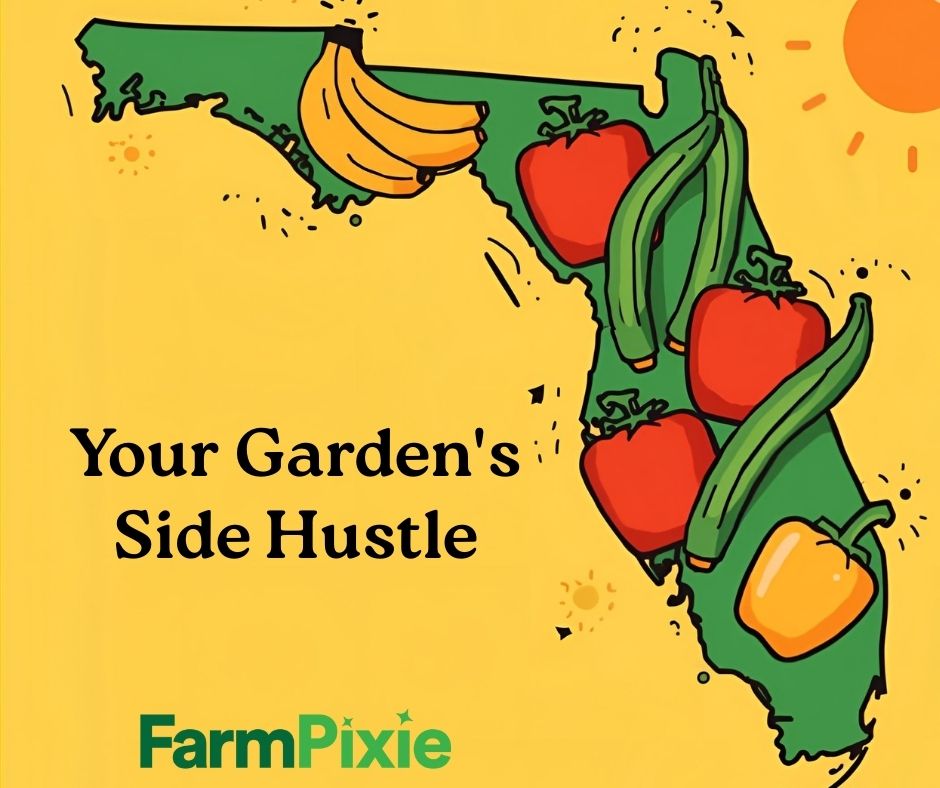From Plot to Profit: What Florida Backyard Gardeners Can Sell From Their Crops
Policies & Legal
Dreaming of turning your green thumb into some extra green in your wallet? Many Florida backyard gardeners, from the bustling urban plots of Tampa and Jacksonville to the small-town farms of the Panhandle, are discovering the joy (and financial benefit) of selling their surplus produce. Thanks to the state's generous "Cottage Food Law," and the inherent simplicity of selling whole, raw agricultural products, it's easier than you might think to go from plot to profit.
So, what exactly can you, the Florida backyard hero, legally sell from your bountiful harvest? Let's dig in!

The Golden Rule: Whole, Uncut, Unprocessed Produce
The easiest and most universally accepted items for a Florida gardener to sell are whole, uncut, and unprocessed fruits and vegetables. Think about it: a perfectly ripe heirloom tomato, a crisp head of lettuce, a basket of juicy strawberries. The Florida Cottage Food Law does not require a license or permit to sell these items because they are considered "non-potentially hazardous" foods. This is a huge advantage for the home grower looking to start a side hustle without extensive regulations.
Examples of what you can almost certainly sell in Florida:
- Tomatoes, Peppers, Eggplants: Your summer staples are always in high demand for fresh salsa and salads.
- Leafy Greens: From local varieties of lettuce and spinach to nutrient-rich kale, these are popular and often fetch a good price.
- Cucumbers, Zucchini, Squash: Often prolific growers, these are excellent for selling surpluses to your neighbors.
- Berries (Strawberries, Blueberries, Raspberries): Nothing beats the taste of Florida-grown berries, a hot seller fresh from the vine.
- Fresh Herbs: Bundle up fresh basil, cilantro, parsley, or mint to add flavor to any dish.
- Root Vegetables: After a good washing, fresh-dug carrots, radishes, beets, and onions are perfect for a local market.
- Melons: Watermelons, cantaloupes, honeydews – especially those sweet, homegrown varieties.
- Pumpkins & Gourds: Seasonal favorites that can bring in a nice autumn income for your garden.
Where to Sell Your Garden Goodies in Florida
Once you have your harvest, where can you turn it into cash in the Sunshine State?
- List on FarmPixie.com: Get your produce in front of local buyers! FarmPixie.com is a dedicated marketplace that connects home growers and small farms directly with consumers. You can list your fresh crops, set your own prices, and reach people in your community who are specifically looking for fresh, local food. It's the best way to streamline your sales and build a customer base without needing a physical stand.
Important Considerations for Florida Growers
While selling whole produce is generally straightforward in Florida, keep these points in mind to ensure you're in compliance with state laws:
- Cut Produce & Processed Foods: This is where Florida's Cottage Food Law gets specific. You cannot sell cut fruits and vegetables (like pre-cut melon or chopped salad mixes) without a commercial food permit. The law is also very clear that you cannot sell "potentially hazardous" processed foods like canned salsa, pickles, or certain baked goods from your home kitchen without the proper permits and inspections. For more details, consult the Florida Department of Agriculture and Consumer Services (FDACS) official guidelines.
- Sales Limits (for processed foods): If you ever venture into true "cottage foods" (like jams, jellies, or certain baked goods that are allowed), be aware that there's an annual gross sales limit of $250,000 for these items. Unprocessed produce, however, is not subject to this cap.
- Food Safety: Even though you're not inspected by the state for selling raw produce, maintaining high food safety standards is paramount. Ensure your produce is clean, handled properly, and fresh for your customers.
- Local Regulations: Always double-check your specific city and county ordinances. While state law may be permissive, local rules in your area might apply to home-based businesses, signage, or roadside sales.
Start Small, Grow Big!
Don't be intimidated! Many successful small farms started as backyard gardens selling surplus produce. Begin by selling a few popular items, gauge your local demand with a listing on FarmPixie.com, and gradually expand as you gain confidence and experience.
Your backyard bounty isn't just for your dinner table anymore. With a little planning and an understanding of Florida's rules, you can turn your passion for gardening into a rewarding side hustle, sharing the delicious taste of fresh, homegrown produce with your community.